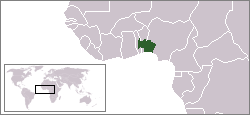
Chrislam refers to a Christian expression of Islam, originating as an assemblage of Islamic and Christian religious practices in Nigeria; in particular, the series of religious movements that merged Muslim and Christian religious practice during the 1970s in Lagos, Nigeria.[1] The movement was pioneered by the Yoruba people in south-west Nigeria.[1] Chrislam works against the conventional understanding of Islam and Christianity as two separate and exclusive religions, seeking out commonalities between both religions and promoting an inclusive union of the two.[1] Chrislam also occupies a distinct geographical space; Nigeria is often understood to be geographically and religiously polarized, with a predominantly Muslim North, and a predominantly Christian South.
Nigeria is religiously split mostly between Muslims and Christians. Nigeria is the most populous country of Africa, with over 213 million inhabitants as of 2021. Muslims and Christians each comprise roughly half of the total population.[2][3] Muslim and Christian encounters in Nigeria have long underpinned sociocultural tensions in the country. Although this has created a political ground for religious and ethnic clashes, this has also required Muslims and Christians to long coexist in Nigeria. Whilst Nigerian Muslims and Christians have experienced periods of sectarian and inter-religious violence, Muslims and Christians have also experienced prolonged periods of social harmony.
There is a limited anthology on Chrislam studies, largely due to its relatively small following predominantly concentrated in Lagos. Some of the most prominent findings have been uncovered by specialists Dr. Marloes Janson, Birgit Meyer, Mustapha Bello and Professor Corey L. Williams. Janson defines Chrislam as an "assemblage"[1] of religious practice, stating that the underlying religious concept of Chrislam is that "to be a Muslim or Christian alone is not enough to guarantee success in this world and the hereafter."[1] As a result, Chrislam combines both Muslim and Christian practices. Chrislam has been described as a unique phenomenon in Nigeria, reflecting the country's religious divisions and history of religious clashes between Muslim and Christian groups.[4]
- ^ a b c d e Janson, Marloes (November 2016). "Unity Through Diversity: A Case Study of Chrislam in Lagos" (PDF). Africa: Journal of the International African Institute. 86 (4): 646–672. doi:10.1017/S0001972016000607. S2CID 147663644 – via ResearchGate, SOAS.
- ^ "Religion in Nigeria | Nigerian Religions | PEW-GRF". globalreligiousfutures.org. Retrieved 2020-05-06.
- ^ "Population, total - Nigeria | Data". data.worldbank.org. Retrieved 2020-05-06.
- ^ Williams, Corey L. (April 2019). "Chrislam, Accommodation and the Politics of Religious Bricolage in Nigeria". Studies in World Christianity. 25 (1): 5–28. doi:10.3366/swc.2019.0239. hdl:1887/135488. S2CID 150741382.
